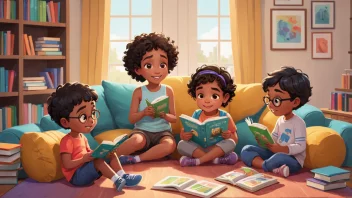What are problem-solving and critical thinking skills?
Problem-solving and critical thinking skills are essential abilities that allow individuals to analyze information, evaluate different perspectives, and devise effective solutions to challenges. These skills are particularly important in childhood as they lay the foundation for future learning and decision-making.
Why are books important for developing these skills in children?
Books can be powerful tools for fostering problem-solving and critical thinking skills. They expose children to new ideas, diverse perspectives, and complex scenarios that challenge their understanding. Engaging with characters facing dilemmas encourages young readers to think critically about the choices characters make and how they might approach similar situations.
What types of books should I look for to promote these skills?
- Interactive Storybooks: Books that involve readers in the plot, prompting them to make decisions or solve puzzles.
- Mystery Novels: Stories that require readers to piece together clues and solve the mystery alongside the characters.
- Science and Math Books: Non-fiction books that present real-world problems and encourage readers to think creatively about solutions.
- Classic Tales with Moral Dilemmas: Stories that challenge characters with ethical decisions, prompting readers to reflect on their values.
Can you recommend some specific books that encourage problem-solving?
- The Mysteries of Harris Burdick by Chris Van Allsburg - This picture book presents a series of mysterious illustrations and captions, inviting readers to create their own stories and solve the puzzles within.
- What Do You Do With a Problem? by Kobi Yamada - A beautifully illustrated tale that encourages children to confront their problems and see them as opportunities for growth.
- Math Curse by Jon Scieszka - This humorous story blends math with everyday situations, challenging readers to think critically about how math applies to solving real-life problems.
- The Boxcar Children series by Gertrude Chandler Warner - Following four siblings who solve various mysteries and challenges, these books encourage critical thinking and teamwork.
- Escape from Mr. Lemoncello's Library by Chris Grabenstein - A fun and engaging story about a group of kids who must solve puzzles to escape a magical library, promoting creative problem-solving.
How can I encourage my child to engage with these books?
Here are some tips to encourage your child to engage with problem-solving books:
- Discuss the Story: After reading, ask open-ended questions about the characters' choices and what your child would have done differently.
- Interactive Reading: Encourage your child to predict what might happen next or to suggest alternative endings.
- Relate to Real Life: Connect the themes of the book to real-life situations, encouraging your child to think critically about their own experiences.
- Make it Fun: Incorporate games or activities related to the book's themes to reinforce the lessons in an enjoyable way.
Are there any online resources to support these skills?
Yes! There are numerous online resources available for parents and educators looking to enhance problem-solving and critical thinking skills in children:
- Educational Websites: Sites like Reading Rockets and Education.com offer articles, activities, and book recommendations.
- Online Book Clubs: Joining a virtual book club can provide children with the opportunity to discuss their thoughts and ideas with peers, fostering critical dialogue.
- Interactive Apps: Several educational apps and games are designed to develop logical thinking and problem-solving skills through engaging challenges.
What age groups are these books suitable for?
The recommended books vary in age suitability:
- Picture Books: Ideal for preschool to early elementary (ages 3-7).
- Early Chapter Books: Suitable for ages 7-10, these books often incorporate simple narratives with complex themes.
- Middle Grade Novels: Appropriate for ages 10-12, these books typically feature more intricate plots and character development.
Final Thoughts
Encouraging problem-solving and critical thinking in children through literature is a rewarding endeavor. By selecting engaging books and fostering discussions around them, we can inspire the next generation to think independently and creatively. Explore the recommended titles and consider integrating them into your child's reading routine to nurture these invaluable skills.






